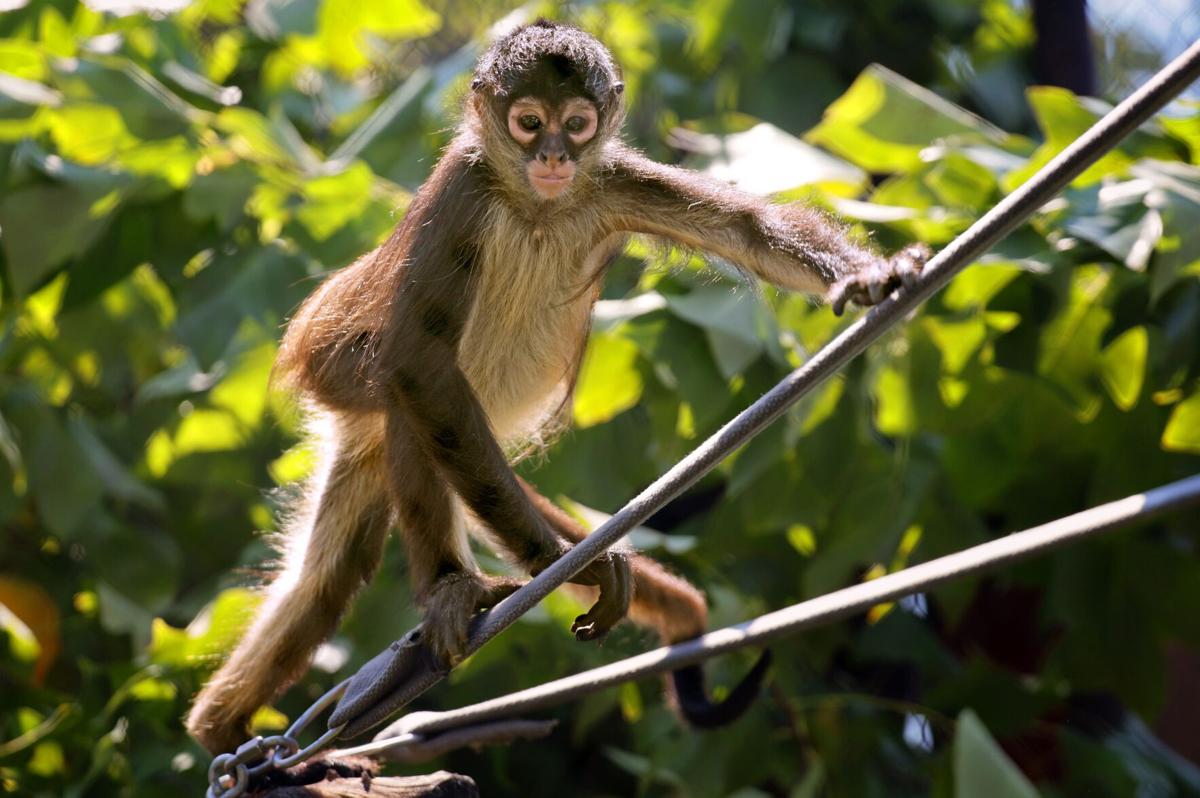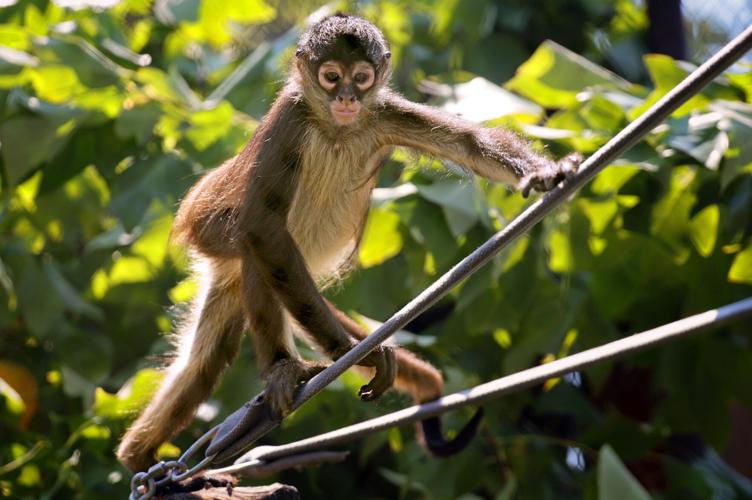ST. LOUIS — Four endangered Mexican spider monkeys rescued from smugglers near the southern U.S. border have found a home at the St. Louis Zoo.
It marks the first time in recent memory the 115-year-old institution has taken permanent possession of confiscated primates. Zoo staff hope the monkeys’ story can raise awareness about the devastation caused by the illegal wildlife trade.
“These animals are ambassadors for their wild counterparts,” said Heidi Hellmuth, the zoo’s curator of primates.
Zoos generally are not in the rescue business. With tens of thousands of animals illegally smuggled into the country every year, however, institutions increasingly are seeing trafficking awareness and prevention as another aspect of their conservation work.
At the same time, wildlife advocates say the viral popularity of documentaries such as “Chimp Crazy” — which profiled a local woman’s legal battle over her pet chimpanzees — is leading more Americans to recognize the need for tougher federal legislation amid a patchwork of regulations across the U.S.
People are also reading…
Nearly 50,000 live species were seized or abandoned at U.S. ports of entry from 2015 to 2019, according to U.S. Fish and Wildlife data analyzed by the Association of Zoos and Aquariums, a nonprofit that establishes standards for animal care at zoos.
In particular, the St. Louis Zoo and AZA are advocating for the passage of the Captive Primate Safety Act to regulate the possession of primates as pets. The bill has been introduced in Congress numerous times, dating back to 2005. It was reintroduced in the House and Senate last year.
“This is a global crisis,” said Sara Walker, senior adviser on wildlife trafficking for the AZA. “It is a story of demand, access and availability.”

Chico, a spider monkey that had been illegally trafficked into the U.S. from Mexico and confiscated, retrieves a snack on Tuesday, Aug. 12, 2025, at the St. Louis Zoo's Primate Canopy Trails exhibit.
Cute but messy
The first time St. Louis Zoo primate keeper Shannon Farrell saw the quartet of Mexican spider monkeys in person was in April on a parking lot in Oklahoma City.
She and another zoo staffer drove from St. Louis to pick them up from a team from Gladys Porter Zoo in Brownsville, Texas, which had rehabilitated the monkeys after U.S. officials confiscated them and 15 other spider monkeys in a series of seizures last year.
Officials believe they were poached from the wild somewhere in Mexico or Central America to be sold as exotic pets. Poachers typically will kill the mothers and other members of a troop to get to the babies. They then are taken across the U.S. border, often hidden in wheel wells, glove boxes or other cramped areas in hopes of avoiding detection and confiscation. Many arrive dead or in poor health.
The four monkeys were terrified, Farrell said, huddled together in a ball of lanky limbs and black-and-tan fur in a transport crate bedded with hay. One still has birdshot behind one of her ears.
“When they get rescued, they’re housed with other spider monkey babies that have had equal if not more trauma,” Farrell said. “It’s like taking a bunch of kindergarteners and throwing them altogether, (where) they have nobody else they know and no direction.”

Xochitl, a spider monkey that had been illegally trafficked into the U.S. from Mexico and confiscated, frolics and snacks on Tuesday, Aug. 12, 2025, at the St. Louis Zoo's Primate Canopy Trails exhibit.
It’s not hard to see why people would want spider monkeys as pets: They are cute, with pot bellies and prehensile tails, and weigh about as much as a small dog.
They also are among the messiest primates.
Their excrement is “splattery,” Farrell said; putting them in diapers — as they often are when kept as pets — would result in continuous blowouts, she said.
“They are particularly gross. Everything is covered in poop,” she said. “People have no idea what they’d be getting into.”
Then there are the zoonotic diseases and behavior issues that often arise when keeping a wild animal as a pet. Spider monkeys can be dangerous and unpredictable and can live up to 50 years. Humans cannot replicate the social and mental needs that spider monkeys get from their own troops, keepers say.
The St. Louis Zoo began planning for the spider monkeys’ arrival more than a year ago. The zoo’s existing trio of spider monkeys was dwindling due to old age, and the species does not do well as solitary creatures. A week after the quartet arrived here, only Patty, a 31-year-old black-handed spider monkey, was left. She and the newcomers quickly acclimated to each other, however, and now hang out at the Primate Canopy Trails on Historic Hill.
The four were given names to reflect their origins and personalities: Chico, the male; and three females: Chula, Oxomátli (oh-zoh-MAHT-lee) and Xóchitl (SO-cheel).
Zoo staff hope they can breed. Mexican spider monkeys are considered endangered by international treaty, though they are not protected under the U.S. Endangered Species Act.
Staff are not sure how the monkeys’ beginnings will impact their behavior as they reach sexual maturity.
“That kind of life experience early on is going to affect them their entire lives,” Hellmuth said.

Ozomati, a spider monkey that had been illegally trafficked into the U.S. from Mexico and confiscated, frolics and snacks on Tuesday, Aug. 12, 2025, at the St. Louis Zoo's Primate Canopy Trails exhibit.
Patchwork laws
As the spider monkeys began exploring their new habitat last month, Tonia Haddix was asking a federal judge in St. Louis for mercy.
Haddix, who once ran a primate facility in Festus, faced 20 years in prison for lying to the courts about keeping a chimp after being ordered not to. She was sentenced to nearly four years in prison on Aug. 7.
Her case earned national attention as a de facto epilogue to “Chimp Crazy,” a documentary that detailed her legal battle with animal rights groups over her efforts to keep chimps as pets.
The state of Missouri does not allow people to keep primates unless they register the animal with a local municipality or county, as was the case in Jefferson County, where Haddix ran her facility and where authorities earlier this year helped track down a spider monkey that got loose from a home near Highways 21 and M.
Documentaries like “Chimp Crazy” and “Tiger King” — which depicted some of the eccentric personalities in big cat breeding — often hasten the public’s stance on toughening laws against the exotic animal trade, said Walker, the AZA’s senior adviser on wildlife trafficking.
A few years after “Tiger King” debuted, President Joe Biden signed into law the Big Cat Public Safety Act, which bans private ownership and breeding of big cats.
Adovcates are impact on the Captive Primate Safety Act, a bill that would prohibit the private ownership of primates as pets across the country.
The issue historically has had bipartisan support, Walker said. In addition to the environmental impacts, wildlife trafficking also impacts national security — transnational criminal organizations are often involved behind the illegal pet trade, which also evades border controls, the AZA has said.
At the St. Louis Zoo, Hellmuth, the primate curator, hopes the four spider monkeys can create an emotional connection on the issue with visitors.
“Primates as pets are bad whether they’re bred here or trafficked,” she said.
Post-Dispatch photographers capture tens of thousands of images and hours of footage every year. See some of their best work from July 2025 here.












